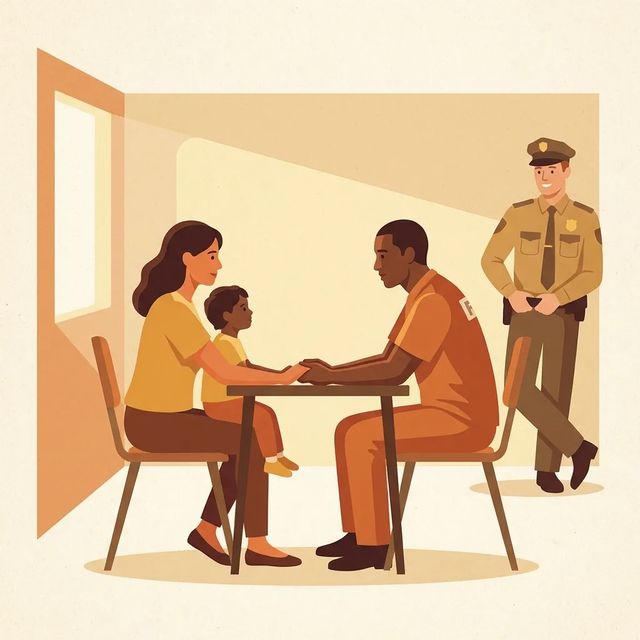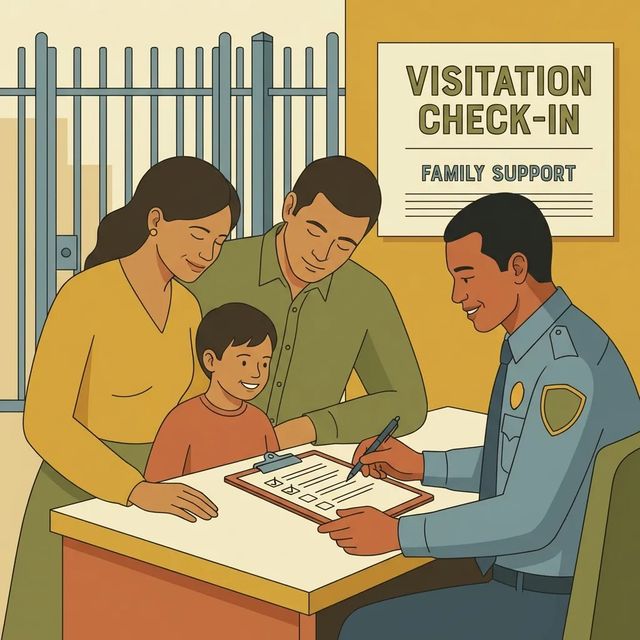Leon County Jail, TX
Need to reach someone at Leon County Jail? Look up an inmate, send messages or mail, add commissary funds, or schedule a visit.
Explore
Find an Inmate at Leon County Jail, TX
Search for a loved one and send messages and photos in minutes.

Guides for This Facility

How to Put Money on an Inmate's Account at Leon County Jail (Kiosk, Online, Phone)
Want to put money on someone's account at Leon County Jail? You've got a few options—but mail-in deposits aren't one of them.
Read Guide
How to Schedule Video Visits with Leon County Jail (Including the Library 'Family Time & Tales' Program)
Video visits at Leon County Jail go through Securus. Once you know where to register and how far ahead to book — especially for Family Time & Tales — it's pretty straightforward.
Read Guide
Leon County Jail Reopened In-Person Visits (Feb 26, 2024): What Changed and How to Prepare
Leon County Detention Facility reopened in-person visitation on Monday, February 26, 2024. Planning a visit? Keep three things in mind: the daily visit windows (with an evening break), the 30-minute time limit, and the strict "ID + keys only" rule at the door.
Read GuideAt a Glance
Visitation
- In-person visitation reopened Feb 26, 2024; daytime visits start at 8:30 a.m., with the last start at 4:00 p.m. (ending 4:30 p.m.).
- Evening visitation begins at 5:30 p.m., with the final visit starting at 7:00 p.m. (ending 7:30 p.m.).
- Each visitor is allowed 30 minutes and may visit one person per day; visits cannot be split between inmates.
Communication
- Securus remote or on-site video visits cost between $5 and $95 for a 30-minute visit.
- To add funds to an inmate telephone account, Leon County Jail directs users to the Securus vendor site.
- Securus Direct Bill lets recipients receive inmate calls billed directly on a monthly statement, subject to a required credit check.
Mail & Letters
- Personal mail sent to the Securus Digital Mail Center is scanned and delivered to the inmate's issued tablet.
- Legal or privileged mail must be mailed directly to the detention facility PO Box address.
- Magazine and newspaper subscriptions are accepted only if mailed directly from the publisher.
Sending Commissary
- A public kiosk in the detention facility lobby is available to the public for deposits.
- The facility stopped accepting deposits through the visitation lobby or by mail on December 15, 2008.
- Care packages (snacks and personal-care items) can be purchased online at iCareGifts.com or by calling 877-615-3296.
Facility Info
- Copies of the Leon County Jail inmate handbook are available on inmates' issued electronic tablets.
- The handbook contains a Mail section located on page 40.
- The handbook contains a Visitation section located on page 44.
Based on official sources and community feedback.Learn how we verify
Topic Overviews
Visitation
Leon County Jail reopened in-person visitation on Monday, February 26, 2024. Daytime visits run from 8:30 a.m. to 4:30 p.m., with the last visit starting at 4:00 p.m. Evening hours are 5:30 p.m. to 7:30 p.m., last start at 7:00 p.m. Each visit lasts 30 minutes, and you can only visit one person per day—no splitting time between inmates. You must be at least 16 years old and bring valid ID. Attorneys get 60-minute visits and can book multiple time slots if needed. All visits—in-person and video—are monitored and recorded. Remote video visits are scheduled through securustech.net.
Read full guideCommunication
Leon County Jail uses Securus for communication services, including video visitation. A 30-minute video visit costs between $5 and $95, depending on the type. To fund phone calls, add money through the Securus vendor site listed by the facility. Want to receive calls? Securus Direct Bill lets you get billed monthly—though enrollment requires a credit check. JPay services are also available through the JPay mobile app for messaging and account management. Visit types, scheduling rules, and features vary by unit, so handle everything through the approved vendor portal.
Read full guideMail & Letters
Leon County Jail routes personal (non-privileged) mail through the Securus Digital Mail Center. Letters are scanned and delivered electronically to the inmate's tablet. Legal or privileged mail goes directly to the detention facility PO Box and follows the jail's legal-mail procedures. Magazines and newspapers are only accepted when sent straight from the publisher. Religious or spiritual materials must also come from the publisher and be approved through the Chaplains Office. The jail doesn't accept packages or books—anything else gets returned to sender. Mail with powder, perfume, glue, or glitter will be sent back, and both the inmate and sender are notified when something is rejected. Need an inmate's signature on documents? Drop them off Monday–Friday for processing and pickup.
Read full guideSending Commissary
To add money to an inmate's account at Leon County Jail, use the public kiosk in the detention facility lobby. The jail stopped accepting deposits through the visitation lobby or by mail on December 15, 2008—stick to the facility's listed deposit methods. Want to send items instead of cash? Order care packages with snacks and personal-care products through iCareGifts.com or by calling 877-615-3296. For refunds, your request must include the inmate's name, inmate ID number, your residential address, and a daytime phone number. Submit it within 30 days. Mailed refunds take up to eight weeks. Card refunds requested by phone at 888-506-8407 process the same day—about 15 minutes.
Read full guideCommon Questions
Showing 6 of 16How long can attorneys visit an inmate at Leon County Jail?
Attorneys receive 60-minute visits at Leon County Jail. If more time is needed, attorneys may block multiple visit times.
VisitationAre visits monitored or recorded at Leon County Jail?
Yes. All visits at Leon County Jail—both in-person and video—are monitored and recorded.
VisitationWhat are the age and ID requirements for visitors at Leon County Jail?
Visitors must be at least 16 years old and present valid identification to be admitted.
VisitationHow much do video visits cost at Leon County Jail?
Securus charges between $5 and $95 for a 30-minute video visit.
CommunicationHow do I add money to an inmate's phone account at Leon County Jail?
Add funds through the Securus vendor site the facility lists. Sign in, enter the inmate's ID, and pay using the available payment options.
CommunicationCan I receive calls directly from an inmate and how am I billed?
Yes. Leon County Jail supports Securus Direct Bill, which bills the call recipient on a monthly statement, and you must pass a credit check to enroll.
CommunicationMore Guides
Ready to Connect?
Search for your loved one to start communicating today
Did You Know?
The information comes from the official Inmate Handbook, revised March 2024.
This guide is based on feedback from dozens of families and official facility documentation. Learn how we verify
